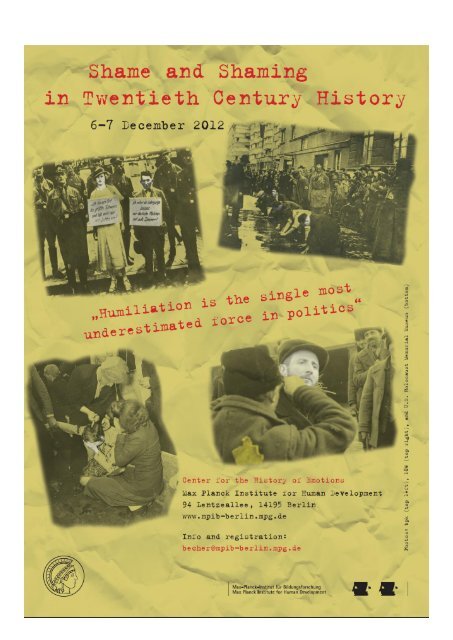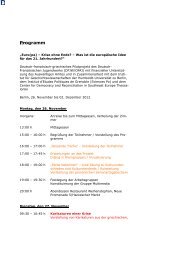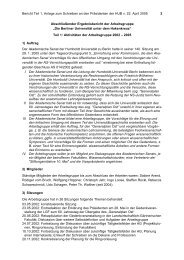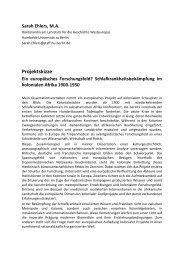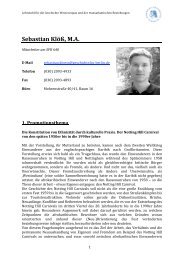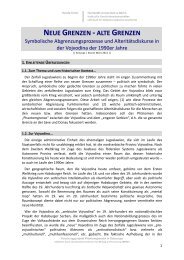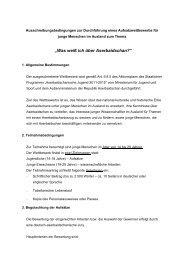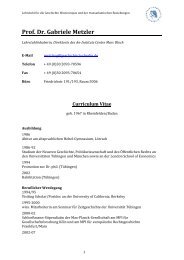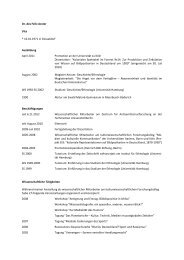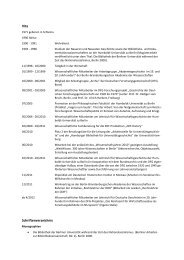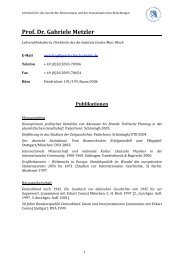Die Bildung der Gefühle - Institut für Geschichtswissenschaften
Die Bildung der Gefühle - Institut für Geschichtswissenschaften
Die Bildung der Gefühle - Institut für Geschichtswissenschaften
Create successful ePaper yourself
Turn your PDF publications into a flip-book with our unique Google optimized e-Paper software.
Thursday, December 6<br />
Registration<br />
8:30-9:00 Foyer<br />
Definitions, Explanations, Contexts<br />
9:00 – 10:30 Ute Frevert : Historical semantics and social norms Large conference room<br />
Luc Ciompi : Do collective emotions make history? The effects of shame, the ―master‖ emotion<br />
Coffee Break<br />
10:30 – 11:00<br />
Social Practices of shaming<br />
11:00-13:15 Chair: Mary Fulbrook Large conference room<br />
Lunch<br />
Anne Ru<strong>der</strong>mann: The ―Femmes Tondues‖ and the historicization of shame<br />
Maren Röger: Shaming Practices in World War II-Poland and Postwar-Sanctions against<br />
Female Fraternizers<br />
Ismee Tames: Shame and Shaming: Nazi-Collaborators and their Families in Postwar Dutch<br />
Society<br />
13:15 – 14:00 Foyer<br />
Justice, guilt and shame<br />
14:00 – 16:15 Chair: Ute Frevert Large conference room<br />
Coffee Break<br />
Barak Kushner: Searching for Shame in Immediate Postwar East Asia: The Pursuit of<br />
Justice and the Dilemma of Benevolence<br />
Ann Goldberg: Nazism and Defamation Litigation in Postwar West Germany<br />
Mary Fulbrook: Guilt and shame among ‗perpetrators‘ and ‗victims‘<br />
16:15 – 16:45<br />
Foyer<br />
UCL project: Researching and Searching for Postwar Shame. Presences and Absences<br />
16:45-17:45 Brief presentations by Julia Wagner, Christiane Wienand, Alex Hills, Gaelle Fisher
Keynote<br />
18:00-19:30 Large conference room<br />
Ruth Leys: The Disappearance of Shame?<br />
Friday, December 7<br />
Power and shame (1)<br />
9:00 – 11:15 Chair: Uta Gerhardt<br />
11:15 – 11:45 Coffee break<br />
Power and shame (2)<br />
Karolina Wigura: The Shaming and the Declarations of Forgiveness and Repentance in Poland<br />
after World War II<br />
Ulrike Weckel: Shamed by Nazi Crimes: The First Step towards Germans‘ Reeducation or a<br />
Catalyst for their Wish to Forget?<br />
Stefanie Bird: Perpetrator trauma and shame<br />
11:45-13:15 Chair: Stephanie Bird Large conference room<br />
Lunch<br />
Alexey Tikhomirov: From Shame to Pride: a Moral Economy of Victors and Defeatists in Post-<br />
War East Germany (1945-1956)<br />
Phil Leask: Humiliation, shame and ―normalization‖ in the GDR<br />
13:15 – 14:00 Foyer<br />
Literary representations<br />
14:00-16:00 Chair: Benno Gammerl Large conference room<br />
Aneta Stępień: The Flesh of Shame: Representation of collective and individual shame in<br />
Hubert Klimko-Dobrzaniecki‘s Raz. Dwa.Trzy<br />
Agnieszka Komorowska: Shame in the Literature of the Shoah – the Ethics of Testimony<br />
Round Table<br />
16:00 – 17:00 Large conference room
Abstracts & Bios<br />
Stephanie Bird<br />
Perpetrator Trauma and Shame<br />
By approaching trauma and shame from the figure of the perpetrator of abusive and violent acts, this paper<br />
explores the relationship between trauma, shame and moral transgression. With reference to Robert Musil‘s The<br />
Confusions of the Young Törleß, I argue that the notions of agency and action are central to an un<strong>der</strong>standing of<br />
trauma, guilt and remorse. What this novel suggests, however, is that shame obstructs ethical behaviour. By<br />
drawing on a range of writings on shame I shall consi<strong>der</strong> how far shamelessness may in fact be vital for<br />
addressing guilt.<br />
Stephanie Bird is Senior Lecturer in German at University College London. She has published on topics ranging<br />
from the interaction of fact and fiction in the biographical novel, the relationship of female and national<br />
identity, and the representation and ethics of shame. She is currently the Co-Investigator on the AHRC funded<br />
project ‗The Reverberations of War‘ and is working on a comparative study of the role of comedy in the<br />
representation of suffering and the traumatic past in the work of post-war German-language writers and<br />
directors. These include Ingeborg Bachmann, Rainer Werner Fassbin<strong>der</strong>, W. G. Sebald and Volker Koepp.<br />
Luc Ciompi<br />
Do Collective Emotions Make History? – The Effects of Shame, the “Master Emotion”<br />
The thesis that collective emotions can ―make history‖ has recently been developed in a book by Elke En<strong>der</strong>t and<br />
myself*. Here, I will focus on the effects of shame, a ―master emotion‖ according to the American sociologist<br />
Thomas Sheff. Shame provokes specific reparative emotional dynamics: feelings of guilt and depression may<br />
gradually be replaced by envy, hate, agression and feelings of grandiosity. By integrating recent findings from<br />
sociology, neurobiology and evolutionary sciences, emotions appear as goal-directed energetic states. When<br />
individual emotional energies are bundled and directed in the same direction, they can have devastating<br />
macrosocial effects. Striking historical examples include the rise of German national-socialism, the Israel-<br />
Palestina-conflict and the recent ―Arab spring.‖<br />
*Ciompi, L., En<strong>der</strong>t, E. <strong>Gefühle</strong> machen Geschichte. <strong>Die</strong> Wirkung kollektiver Emotionen - von Hitler bis Obama.<br />
Vandenhoeck & Ruprecht, Göttingen 2011<br />
Luc Ciompi Prof. Dr.med. em., Dr. h.c.was born in Florence/Italy in 1929. Former director of the socio-psychiatric<br />
university clinic in Berne/Switzerland (1977-94). Foun<strong>der</strong> of the therapeutic community „Soteria Berne―. Author<br />
of the concept of affect-logic, a theory on omnipresent interactions between emotion and cognition, with<br />
numerous implications in psychiatry, psychology and sociology. Numerous scientific publications and awards.<br />
Ute Frevert is Director at the Max Planck <strong>Institut</strong>e for Human Development and Scientific Member of the Max<br />
Planck Society. Between 2003 and 2007 she was a professor of German history at Yale University and prior to<br />
that she taught History at the Universities of Konstanz, Bielefeld and the Free University in Berlin. Her research<br />
interests include social and cultural history of mo<strong>der</strong>n times, gen<strong>der</strong> history and political history. Some of her<br />
best known work has examined the history of women and gen<strong>der</strong> relations in mo<strong>der</strong>n Germany, social and<br />
medical policy in 19th century Germany, and the impact of military conscription on German society from 1814 to<br />
the present day. Ute Frevert is an honorary professor at the Free University in Berlin and member of several<br />
scientific boards; she was awarded the prestigious Leibniz Prize in 1998.
Mary Fulbrook is Professor of German History at UCL. Her research interests have ranged across a variety of<br />
fields, including religion and society in early mo<strong>der</strong>n Europe, the German dictatorships of the twentieth century,<br />
Europe after the Holocaust, and historiography and social theory. Mary Fulbrook's teaching ranges from<br />
introductory courses on German history from medieval times to the present, through to more specialized sourceled<br />
teaching on the German Democratic Republic (GDR) and MA courses on 'Theoretical Issues in History and<br />
Literature', and 'The Making of Mo<strong>der</strong>n Europe'. She supervises a number of PhD students and runs regular<br />
graduate student seminars and workshops. Among other professional commitments, Mary Fulbrook is currently<br />
Chair of the Mo<strong>der</strong>n History Section of the British Academy. Mary Fulbrook's contributions to UCL have included<br />
nearly a dozen years as Head of the German Department (January 1995 to September 2006) as well as a stint<br />
serving on UCL Council. She is currently Vice-Dean (Interdisciplinarity), Faculty of Arts and Humanities.<br />
Benno Gammerl works at the Max Planck <strong>Institut</strong>e for Human Development, Center for the History of Emotions,<br />
in Berlin. His current project analyses oral histories about homosexuality and emotional life in rural West-<br />
Germany between 1960 and 1990. He received his Ph.D. from Freie Universität Berlin in 2008 with a thesis about<br />
citizenship, nationality and the handling of ethnic heterogeneity in the British and the Habsburg empires<br />
between 1867 and 1918. Publications include: Emotional styles: Concepts and challenges. In: Rethinking History<br />
16 (2012), 2, p. 161-175. Frau Muskeltyp, Herr Hexe und Fräulein Butch? Geschlechtlichkeiten und<br />
Homosexualitäten in <strong>der</strong> zweiten Hälfte des 20. Jahrhun<strong>der</strong>ts. In: Julia Paulus, Eva-Maria Silies und Kerstin Wolf<br />
(Hg.), Zeitgeschichte als Geschlechtergeschichte: Neue Perspektiven auf die Bundesrepublik, Frankfurt am Main:<br />
Campus, 2012, p. 225-245. Subjects, Citizens and Others. The Handling of Ethnic Differences in the British and<br />
the Habsburg Empire (late 19th and early 20th century). In: European Review of History - Revue Européenne<br />
d'Histoire 16 (2009), 4, p. 523-549.<br />
Uta Gerhardt has held academic positions, from 1965 until her retirement in 2003, at the Free University in<br />
Berlin, the University of Konstanz, University of London (Bedford College), Justus Liebig University Giessen<br />
Medical School, and Ruprecht-Karls-University Heidelberg where she held a Full Professorship in Allgemeine<br />
Soziologie (Lehrstuhl <strong>für</strong> Soziologie II). She has been Research Associate/Visiting Professor at the University of<br />
Tübingen, University of California San Francisco, University of Wisconsin Madison, New York University, Case<br />
Western Reserve University Cleveland OH as well as Harvard University (eight visits, 1986-2003) and the German<br />
Historical <strong>Institut</strong>e in Washington. Her most recent two books: A history of German sociology tracing six<br />
scenarios from the early 20 th century to the Re-unification and how the social changes have been analyzed in<br />
theory and research; her other recent book gives a full picture of the social thought of Parsons, detailing three<br />
phases of his sociology that echo the history of the US between the 1920s and late 1970s, and also Germany in<br />
the 1930s and 1940s.<br />
Ann Goldberg<br />
Nazism and Defamation Litigation in Postwar West Germany<br />
This talk examines the ritual shaming of former Nazis via postwar denunciations and the resulting defamation<br />
lawsuits brought by the accused. The documents of those lawsuits suggest two parallel discourses of guilt/shame<br />
among former Nazis: one purely formal, legal, and instrumental; the other private, suppressed and involving<br />
questions of guilt and responsibility within a far-right rhetoric carried over from the Third Reich.<br />
Ann Goldberg is professor of European history at the University of California, Riverside. She is the author of Sex,<br />
Religion and the Making of Mo<strong>der</strong>n Madness (1999) and Honor, Politics, and the Law in Imperial Germany (2010).
Agnieszka Komorowska<br />
Shame in the Literature of the Shoah – the Ethics of Testimony<br />
The paper addresses the meaning of shame in literary testimony of the Shoah in post-war France. It proposes a<br />
reading of Robert Antelme‘s L’espèce humaine (1947), one of the first published testimonies of survival in the<br />
concentration camps, as well as Marguerite Duras‘ La douleur (1945/1985), a diary in which the author describes<br />
the waiting for the return of her deported husband, Robert Antelme. The example of Antelme and Duras‘<br />
confronts us with questions on the legitimacy of representation and allows insight on the interplay of emotion,<br />
gen<strong>der</strong> and the right to speak: as a survivor of the concentration camps Gan<strong>der</strong>sheim and Dachau, male political<br />
prisoner and known communist Robert Antelme occupies a different place in intellectual France than his former<br />
wife, Marguerite Duras, whose book appeals to the rea<strong>der</strong> through the prospect of the intimacy and emotional<br />
intensity of a diary, while at the same time linking emotion and politics.<br />
Agnieszka Komorowska is a researcher in French Literature at the University of Mannheim. She has studied<br />
comparative literature and Lettres Mo<strong>der</strong>nes at the Universities of Duisburg-Essen and Jean Moulin Lyon III. From<br />
2008 until 2012, she had worked as a researcher at the French Department of the Ruhr-University of Bochum.<br />
She is currently writing the last chapters of her PhD thesis on the representation of shame in the French novel<br />
since the 1980s. Her research focuses on the interplay of literature and emotions, phenomenology and the<br />
contemporary novel in France. She has presented papers and published articles on Marguerite Duras, Georges-<br />
Arthur Goldschmidt and Cécile Wajsbrot, organised an international conference on ―Espace et affectivité‖ and<br />
co-edited a dossier on Michel Houellebecq in the journal Lendemains (Vol. 36/2011).<br />
Barak Kushner<br />
Searching for Shame in Immediate Postwar East Asia: The Pursuit of Justice and the Dilemma of<br />
Benevolence<br />
The difficulty of dealing with the idea of shame and emotion in postwar East Asia is not only linked to linguistic<br />
and cultural barriers but the religious realm as well. How the Chinese conceive of the issue is mirrored in their<br />
definition of the last 100 years of domestic history as ―humiliating.‖ In contrast, Japan‘s history of tenkō, or<br />
switching allegiance, allowed many to easily benefit from avoiding the more cumbersome weight of<br />
responsibility. My aim in this talk is to look beyond Ruth Benedict‘s outdated framework for un<strong>der</strong>standing<br />
Japanese soldiers and to coax forward our un<strong>der</strong>standing of the deeper psyche involved as the result of<br />
interaction between China and Japan. In Japan the idea of pushing against futility, knowing one is going to lose<br />
yet chasing a doomed goal from the outset, is frequently denoted as heroic. As such, it is often difficult for<br />
Japanese to conceive of war criminals as perpetrators because in war ―all action is by definition against<br />
humanity.‖ Soldiers are thrown into conflict not of their own will. There are, in fact, four categories of Japanese<br />
war criminal: victims of the Chinese Nationalists (KMT), those who exuded contrition with the Chinese<br />
Communist Party (CCP), those who continued to wage war in former areas of the empire, and those who<br />
repatriated without punishment and kept silent. The mix of these soldiers‘ testimony and diaries postwar has led<br />
to a set of ambiguous beliefs about the imperial war and been stirred up into a legally dangerous cocktail in<br />
Japan.The Chinese case is no less sentimental but in the immediate aftermath of surren<strong>der</strong> there was tension<br />
between the idea of pursuing criminals through the new voice of international law, which is punitive, and<br />
satisfying the public calls for blood and retribution which was seen as payback but stood as an anathema to the<br />
courts. As a result the KMT focused on mitigating trials of Japanese war crimes as a way of appearing<br />
benevolent, while the CCP emphasized the cathartic element of Japanese public confessions to satiate the<br />
population‘s interest in witnessing Japanese admit their guilt.This paper will examine and compare the manner in<br />
which both postwar Chinese political parties tried Japanese war criminals and used the courts to show their<br />
―honesty,‖ and at the same time consi<strong>der</strong> the Japanese responses which based their un<strong>der</strong>standing of war and<br />
responsibility on an entirely different axis.<br />
Barak Kushner teaches mo<strong>der</strong>n Japanese history in the Faculty of Asian & Middle Eastern Studies at the
University of Cambridge and has a PhD in History from Princeton University. Previously, Kushner worked in the<br />
US Department of State as a political officer in East Asian affairs and taught Chinese and Japanese history at<br />
Davidson College in the US. As a scholar he has written on wartime Japanese and Chinese propaganda, Japanese<br />
media, Sino-Japanese relations, Asian comedy, food history, war crimes, and the Cold War. He was recently<br />
awarded a 2012 British Academy Mid-Career Fellowship to complete his third book that analyzes the postwar<br />
adjudication of Japanese war crimes in China, tentatively titled, "Men to Devils and Devils to Men": Japanese War<br />
Crimes and Cold War Sino-Japan Relations (1945-1965). In the summer of 2008 he was a visiting scholar at<br />
Nanjing University (China) and during 2009 he was a visiting scholar at Waseda University (Japan). He was a<br />
2008 Abe Fellow and conducted research concerning "Cold War Propaganda in East Asia and Historical<br />
Memory."The Thought War: Japanese Imperial Propaganda, Kushner's first book, delves into the history of wartime<br />
Japanese propaganda. His second monograph, entitled Slurp! A culinary and social history of ramen - Japan's<br />
favorite noodle soup (Brill 2012) focuses on food and history.<br />
Phil Leask<br />
Humiliation, shame and normalization in the GDR<br />
This paper proposes that we see humiliation as a demonstrative exercise of power that is consistently made up of<br />
a number of elements and that has predictable consequences for its victims and for the emotions they feel. What<br />
is often described as ‗shaming‘ behaviour can therefore be better un<strong>der</strong>stood as humiliation. The paper discusses<br />
these issues in relation to the behaviour of Communist lea<strong>der</strong>s in the Soviet Occupation Zone after their return<br />
from exile in Moscow in 1945. It consi<strong>der</strong>s the impact of their earlier humiliation on the way they used power in<br />
the GDR and on their attitude to the widespread humiliation of Germans by the Red Army, particularly through<br />
the rape of German women. Using Mary Fulbrook‘s view of the complex nature of the ―normalization‖ process<br />
after a major rupture, it points to the difficulties of ―normalizing‖ a society when a cycle of humiliation has not<br />
been broken.<br />
Phil Leask is a writer and researcher with a PhD from University College London. His doctoral dissertation<br />
consi<strong>der</strong>ed the concept of humiliation and its significance in representations of the GDR. He is currently working<br />
on a research project on narratives of identity across generations and across bor<strong>der</strong>s, drawing on personal<br />
accounts of people in or from the GDR.<br />
Ruth Leys<br />
The Disappearance of Shame?<br />
I plan to show that the anti-intentionalism and materialism that have characterized recent attempts to<br />
conceptualize shame have continued to prevail among theorists and scholars of many kinds. I will argue that<br />
recent neuropsychoanalytic and related neuroscientific approaches to the “emotional brain” have produced, as one<br />
of their consequences, an account of survivors of trauma and of various cerebral lesions and other neurological<br />
disor<strong>der</strong>s as exemplifying new kinds of beings or persons. These are “the new wounded,” people who through the<br />
impact of injury and accidental mutations are so absolutely cut off from their previous identities, so emptied of<br />
interiority and subjectivity, so indifferent to others, and so withdrawn from the world, as to be altogether deprived<br />
of affect. The result is that their capacity to experience emotion of any kind, including shame, is called into<br />
question. My aim will be to critically assess such claims.<br />
Ruth Leys is Professor of Humanities, with a joint appointment in the Department of History. Trained in the<br />
physiological and psychological sciences at Oxford University, she went on to receive her doctoral dissertation in<br />
the History of Science at Harvard University. Throughout her career she has been interested in different aspects<br />
of the history of the life sciences, especially the neurosciences, psychoanalysis, and psychiatry. Her teaching<br />
focuses on aspects of the history and theory of psychoanalysis; the history of psychiatry; the history of the
neurosciences; trauma theory; the mind-body problem; and the history of approaches to the emotions.<br />
Maren Röger<br />
Shaming Practices in World War II-Poland and Postwar-Sanctions against Female Fraternizers<br />
While the history of the French femmes tondues, the shorn women, is quite well known, many Central and<br />
Eastern European countries are a blind spot in regard to gen<strong>der</strong>ed honor punishments during and after World<br />
War II. In this paper, I deal with the shaming practices in occupied Poland and the postwar punishments of<br />
women having consorted with German men. Based on my upcoming monograph about ―Sexual Policies and<br />
Every-Day-Life of German Occupiers in Poland: Prostitution, Fraternization, Violence‖, I firstly want to present<br />
the wide range of disciplinary actions taken against ‛collaborating women‘during the wartime. Women were<br />
already during the occupation subjected to strong social control. Un<strong>der</strong>ground publications motivated their<br />
rea<strong>der</strong>s to sent injurious leaflets to women searching companionship of Germans, and the un<strong>der</strong>ground<br />
jurisdiction committed head shavings and executions on women. Secondly, I will examine the blaming of these<br />
women in the postwar period that differs clearly from the events in France. Poland, which was for a comparable<br />
period of time un<strong>der</strong> German occupation as France, did not experience a similar outbreak of anti-female violence<br />
in the postwar period. The new communist government blamed different groups for patriotic misbehavior out of<br />
political reasons. Among them were the non-communist un<strong>der</strong>ground fighters. Polish women who searched<br />
companionship with Germans during occupation were, however, after 1945 on trial. But judges convicted them<br />
mainly if they collaborated politically.<br />
Dr. Maren Röger, Research fellow at the German Historical <strong>Institut</strong>e, Warsaw, Poland, recent research project:<br />
―Sexual Policies and Every-Day-Life of German Occupiers in Poland: Prostitution, Fraternization, Violence‖. Afore<br />
studies of history, media and cultural studies at the University of Lüneburg (M.A.) and PhD-studies of history at<br />
the University of Gießen, Germany. The dissertation was published in 2011: Flucht, Vertreibung und Umsiedlung.<br />
Mediale Erinnerungen und Debatten in Deutschland und Polen seit 1989. Marburg: Her<strong>der</strong> 2011 (= Studien zur<br />
Ostmitteleuropaforschung 23). The main fields of interest are history of German occupation in Poland, gen<strong>der</strong><br />
history of NS, history of the expulsions, Polish-German relations, media history, cultural memory.<br />
Anne Ru<strong>der</strong>man<br />
The “Femmes Tondues” and the Historicization of Shame<br />
This presentation argues that the phenomenon of head-shaving during the liberation of France in the Second<br />
World War represents a practice of stigmatization via collectivization as it shamed the women in question via<br />
de-individualizing them bodily and collectivizing them lexically and iconographically (through film and<br />
photographs) as the "femmes tondues". The head-shaving that occurred in Liberation France inverted the<br />
supposed crime: The French women accused of sleeping with ―les boches‖ had singled out and individualized<br />
particular German soldiers. The punishment instead marked individual women as part of a dishonorable group.<br />
While French contemporaries, documentary filmmakers and historians have viewed the femmes tondues as the<br />
reassertion of a virile France and the restoration of national honor following the German occupation, American<br />
soldiers filming scenes of the femmes tondues told a very different story, mocking French attempts to reestablish<br />
legitimacy and contesting French sovereignty in the postwar world.<br />
Anne Ru<strong>der</strong>man is a graduate student at Yale University.
Aneta Stępień, University of Surrey<br />
The Flesh of Shame: Representation of Collective and Individual Shame in Hubert Klimko-Dobrzaniecki Raz.<br />
Dwa. Trzy.<br />
In my presentation, I focus on the shame treatment in Poland looking at the novel Raz. Dwa. Trzy (2007), three<br />
narratives of coming-of-age male characters, by Polish author Hubert Klimko-Dobrzaniecki. I am particularly<br />
interested in how these characters‘ bodies are constructed as a site of oppression and abjects, and how their<br />
personal narratives of shame engage with the collective shame that is evoked by the place and the time in which<br />
the novel is set: adequately, Silesia and communist era. The events that took place in Silesia and the shameless<br />
crimes of communism, in which Poles participated not only as victims but often as active agents and<br />
perpetrators, are mirrored in the novel through the construction of the characters, especially their movement<br />
from victim to perpetrator.<br />
Aneta Stępień has an MA in Polish Studies (2003) from THEUniversity of Warsaw and a degree in Polish<br />
Language Teaching (2003). She also holds an M.Litt. in European Culture and Literature (2010) from the<br />
University of Glasgow. She worked at the University of Warsaw, <strong>Institut</strong>e of Polish Language and Culture<br />
(Polonicum), where she taught Polish as a foreign language. Between 2007-2010, she worked in the Slavonic<br />
Department at Glasgow University teaching Polish language and translation.She began her PhD in the autumn<br />
2010, at the University of Surrey (Department of English). Her doctorial thesis is a comparative study of male<br />
shame in the selected novels of Hanif Kureishi, Hubert Klimko-Dobrzaniecki and Philip Roth. Other research<br />
interests include: gen<strong>der</strong> representation in media and literature, Holocaust, shame and trauma narratives, body<br />
and embodiment. In addition to her research at the University of Surrey, she is the co-author and teaches the<br />
un<strong>der</strong>graduate module ‗National Identity, Memory and Trauma in Eastern European Literature‘.<br />
Ismee Tames<br />
Shame and Shaming: Nazi-Collaborators and their Families in Postwar Dutch Society<br />
After the Second World War Dutch Nazi-collaborators were arrested, interned and tried. Historiography has<br />
mainly focused on the early transition period when collaborators were maltreated when arrested, women were<br />
shaved, and other forms of humiliation occurred.<br />
After this initial period, however, new forms of shame and shaming occur. Former collaborators were soon<br />
released and returned into society. My current research focuses on the integration and exclusion of former<br />
National Socialist milieus in the 1950s and 1960s. In my paper I will explore the various ways of shaming and<br />
the varying feelings of shame with regard to former Nazi-collaborators and their families. I will draw on research<br />
findings from my book ‗Besmette jeugd‘ (‗Tainted youth‘, on children of collaborators in the early postwar years,<br />
published 2009) and the new results from my current book that will be published 2013.<br />
Dr. Ismee Tames (1976) is senior researcher at the NIOD, <strong>Institut</strong>e for War, Holocaust and Genocide Studies and<br />
project coordinator of Legacies of Collaboration: The exclusion and integration of former national socialist milieus<br />
in Dutch society; a research program of NIOD/NWO. Prior to this she published Besmette jeugd (Tainted youth) on<br />
the children of Dutch Nazi-collaborators in the post war years (April 2009).<br />
Tames has also published on the First World War (PhD), neutrality, small nations and Dutch-German relations.<br />
She writes both for an academic public and a wi<strong>der</strong> audience.<br />
Alexey Tikhomirov<br />
From Shame to Pride: a Moral Economy of Victors and Defeatists in Post-War East Germany (1945-1956)<br />
During the final period of the Second World War, the Soviet lea<strong>der</strong>ship began to formulate the problem of moral<br />
administration in the occupied territories. Using feelings of shame to re-educate the defeated Germans was a
crucial part of Soviet emotional management of the occupied territories. To restore their national honour, the<br />
Soviet lea<strong>der</strong>ship formulated the following condition and mandated that it be fulfilled: the Germans must<br />
acknowledge their collective guilt for and shame about Nazi crimes. To this end, Soviet officials developed a<br />
culture of shame and guilt that was articulated in party discourses and propaganda images, official ritual and<br />
social practices. With the establishment of the GDR, the discourse of shame was gradually transformed into a<br />
discourse of pride that grew out of the new East German state‘s need for self-affirmation. Instead of being one<br />
of the ―war losers,‖ it wanted to be proud of belonging to the ―camp of history‘s winners,‖ un<strong>der</strong> the lea<strong>der</strong>ship<br />
of the all-powerful victor, Stalin. For their citizens, the GDR offered a new morality of ―a better Germany, [now]<br />
liberated from fascism‖ and a register of positive feelings in which gratitude had an especially prominent place:<br />
the German people were grateful for being liberated from the Nazi threat, for the possibility of building a<br />
―peace-loving, anti-fascist, democratic‖ state, and for Soviet initiatives taken to preserve Germany‘s political and<br />
economic unity. For the GDR, being a socialist country and belonging to the Soviet bloc offered a path that<br />
would compensate for damaged concepts of national honour by re-inventing categories that were important for<br />
the mo<strong>der</strong>n state‘s existence—patriotism and motherland, love and pride—as key emotional components in<br />
legitimizing and stabilizing the state‘s socialist dictatorship.<br />
Dr. Alexey Tikhomirov has been Marie Curie Fellow at School of Slavonic and East European Studies, University<br />
College London since 2011. His most recent project: Forced Trust: Emotional Bonds Between People and State in<br />
Soviet Russia, 1917-1991. He has held Postdoctoral fellowships at Chemnitz University, Tuebingen University and<br />
German Historical <strong>Institut</strong>e in Moscow and he was research fellow at the <strong>Institut</strong>e for European History in<br />
Mainz, Jena University and Karlsruhe University.<br />
UCL project: Researching and Searching for Postwar Shame. Presences and Absences<br />
This joint presentation investigates prerequisites for the presence and reasons for absences of "shame" in<br />
historical and literary sources dating from the post Second World War period in Europe. Based on examples from<br />
our collaborative interdisciplinary research project "Reverberations of War" the talk addresses a variety of aspects<br />
including historical change, generational shifts and communicative contexts as well as the role of the audience,<br />
of gen<strong>der</strong> and of the body as a site of shame.<br />
The speakers are part of the collaborative research project "Reverberations of War" at University College London,<br />
funded by the Arts and Humanities Research Council, UK. Gaelle Fisher and Alexandra Hills are PhD students;<br />
Julia Wagner and Christiane Wienand are postdoctoral research fellows.<br />
Ulrike Weckel<br />
Shamed by Nazi Crimes:<br />
The First Step towards Germans’ Reeducation or a Catalyst for their Wish to Forget?<br />
The piled corpses and emaciated suvivors in Allied atrocity films about the liberation of Nazi concentration<br />
camps were shameful, and much can be said in favor of the thesis that at least the Americans and British staged<br />
their screenings of these films to Germans in 1945-46 as acts of public shaming. While there were few<br />
unambiguous indicators of viewers‘ feeling shame, close analysis of the broad spectrum of audiences‘ responses<br />
shows that almost nobody reacted shamelessly, e.g. praising or defending these crimes. The shaming strategy,<br />
however, offered Germans an escape from their shameful situation by prompting them to shift the moral<br />
spotlight from their attitudes towards Nazi crimes to the Allies presuming the right to publicly shame them.<br />
Furthermore, though shame over Nazis‘ crimes may haved seemed a necessary first step in Germans‘ change of<br />
heart, it predictedly intensified their unwillingness to talk publicly about such shameful things.
Ulrike Weckel, currently Vertretungsprofessorin of German history of the 20th century at the Humboldt<br />
University Berlin, on leave from the Ruhr-University Bochum; most recent book: Beschämende Bil<strong>der</strong>. Deutsche<br />
Reaktionen auf alliierte Dokumentarfilme über brefreite Konzentrationslager (Stuttgart: Steiner, 2012), which<br />
won both the Franz Steiner prize <strong>für</strong> German-American Studies and the Carl Erdmann prize of the German<br />
Historikerverband for an outstanding Habilitation; first book on German women‘s journals in the late 18th<br />
century and their rea<strong>der</strong>s (Tübingen: Niemeyer, 1998); fields of interest: gen<strong>der</strong> history, the enlightenment,<br />
history of sociability, Nazism and German Vergangenheitsbewältigung, audience reception studies, films as<br />
primary sources.<br />
Karolina Wigura<br />
Shaming and the Declarations of Repentance in Poland after World War II<br />
Early years after the World War II in Europe can be named the years of silence and shaming – as the<br />
wrongdoings were almost not mentioned. Around 30 years after the war, however, a shift in European collective<br />
memory occurred, causing a real eruption of memory (Paul Ricoeur described it even as ―compulsive reminding‖).<br />
The process of eliminating the silent shame was strongly connected with the emergence of declarations of<br />
repentance, a new political institution based on speaking about and judging the past. A similar – yet belated -<br />
process has taken place also behind the Iron Curtain, especially in Poland. Important from this point of view were<br />
the declarations of repentance for past evil from before 1989 and the numerous afterwards. In the current public<br />
debate many of these declarations have often been criticized, as badly constructed, or even being political kitch.<br />
However, from the point of longue duree, they may be un<strong>der</strong>stood as an important cultural shift. They all may be<br />
interpreted as indispensable for building a nuanced Polish collective memory paradigm, eliminating silent shame<br />
and strengthening liberal democracy.<br />
Karolina Wigura, Ph.D, studied sociology, philosophy and political science at University of Warsaw and Ludwig-<br />
Maximilian-University in Munich. She works as an assistant professor at <strong>Institut</strong>e of Sociology, University of<br />
Warsaw and a journalist. She currently is a Bronisław Geremek junior fellow at <strong>Institut</strong>e for Human Sciences in<br />
Vienna. Among her interests are problems of ethics, memory, and strong emotions (e.g. disgust, shame, fear) in<br />
political theory. Author of numerous texts about forgiveness and reconciliation in politics. Her book ―The Guilt of<br />
Nations: Forgiveness as a Political Strategy‖ (2011) has been awarded with Józef Tischner award. Co-organizer of<br />
international annual conferences ―Forgiveness: Probing the Boundaries‖ un<strong>der</strong> the program of Interdisciplinary.net.<br />
Laureate of Grand Press Prize 2008 for the interview ―Europe in Death Paralys‖ with Jürgen<br />
Habermas. Co-foun<strong>der</strong> and member of the editorial board of the internet-weekly „KulturaLiberalna.pl‖.


